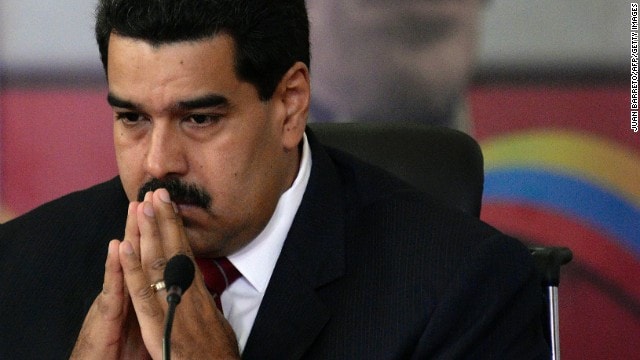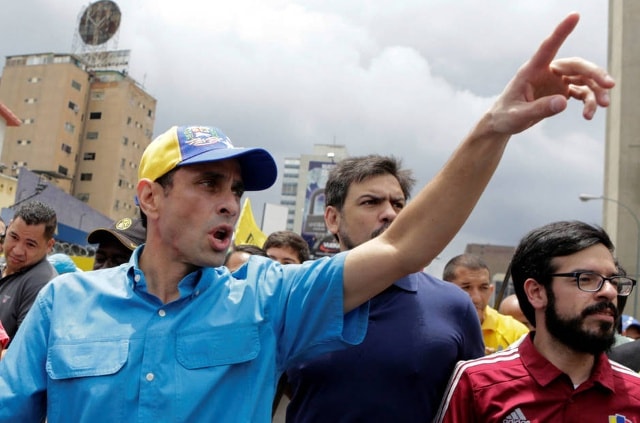Will Venezuela 'follow in Brazil's footsteps'?
(Baonghean) - These days, the President of Venezuela continues to struggle to cope with the dual political and social crisis that is taking place in the country. Although in the latest developments, the Vice President of Venezuela affirmed that the country will not hold a referendum on removing the President; however, Mr. Maduro's political future is still a question mark. Public opinion is concerned, after Brazil, will Latin America witness another bad scenario in Venezuela?
 |
| Venezuelan President Nicolas Maduro is struggling with the crisis. Photo: Getty. |
Anxiously waiting for the signature certification to request dismissal
In just the past week, a series of urgent measures have been introduced by President Nicolas Maduro, showing the seriousness and complexity of the political and social life of this country. For example, on May 13, Mr. Maduro had to declare a state of emergency throughout the country, in order to deal with the plots of the opposition as well as external forces to overthrow his leftist government.
At the same time, the President also had to extend the state of economic emergency for another 3 months, possibly even into 2017, to restore the country's production capacity. On May 15, President Maduro ordered the military to conduct a week of military exercises to deal with foreign threats.
These moves follow a series of temporary measures to address the severe economic crisis in Venezuela, such as moving time zones forward, cutting employee hours, and rolling power outages.
A series of solutions were proposed in the context that the opposition in Venezuela announced that it had collected 2.5 million signatures - far exceeding the level prescribed in the constitution to pave the way for the President's removal.
However, in a recent statement, Venezuelan Vice President Aristobulo Isturiz issued a statement affirming that the country will not conduct a no-confidence referendum against President Maduro. The reason given is that the procedure related to this vote is “faulty”.
Previously, the Venezuelan government has repeatedly accused the opposition of fraud in collecting signatures. Mr. Jorge Rodriguez - Mayor of Caracas and head of the special government commission appointed by President Maduro, together with the National Electoral Commission (CNE) to verify signatures, confirmed that more than 11% of the declarations sent to the Commission did not include all the required information.
Of course, the opposition Democratic Unity Roundtable (MUD) in Venezuela has opposed this statement and asked the National Election Commission to speed up the process of certifying the signature. MUD also criticized the National Election Commission for being slow in this work. This means that the political future of the President of Venezuela will have to wait until June 2, when the signature certification steps are carried out.
However, from now until then, Mr. Maduro will have to face countless difficulties in both handling the severe economic and social crisis in the country and dealing with accusations and pressure from the opposition.
 |
| Venezuelan opposition leader Henrique Capriles. Photo: Reuters. |
Latin American leftist parties in trouble?
The big questions now are: What is the root cause of Venezuela’s dire situation? Is this a domino effect from its fellow country, Brazil, which is also in trouble? And is this a sign of the decline of leftist parties in Latin America?
According to the opposition, President Nicolas Maduro's administration has been too weak and made serious mistakes in economic and energy management policies. President Maduro has repeatedly accused foreign forces, specifically the United States, of being behind the "pushing" of the domestic opposition's moves to overthrow his leftist government.
However, objectively speaking, observers believe that there are reasons for this from both sides. Firstly, it is undeniable that the policy of President Maduro's government, which is heavily dependent on oil, has encountered difficulties when oil prices have fluctuated sharply in recent times. Because oil accounts for 96% of Venezuela's total export turnover. The ruling leftist party in Venezuela has also been accused of corruption and ineffective management. The same thing has happened in Brazil recently. Faced with these unfavorable economic developments, the opposition in both countries will not hesitate to use it as an excuse to attack and overthrow the ruling government.
It is also possible that there may be external interference as President Maduro has alleged. Because Venezuela is one of the leading countries in the leftist movement in Latin America, and is not “in favor” with the US government. However, all these accusations are still just words and have no real basis.
Thus, in the immediate future, the severe political and economic crisis is still a major challenge for President Maduro. At the same time, in case the signatures are certified and Mr. Maduro fails to pass the referendum, Venezuela will have to hold early general elections.
However, this is not the end of Mr. Maduro. Before that, in 2004, a similar referendum was held for his predecessor, the late President Hugo Chavez. However, Mr. Hugo Chavez won. Therefore, the final answer to the question: "Will Venezuela follow Brazil?" - the final answer depends very much on the efforts of President Maduro himself and his administration to steer and handle the crisis in the coming months.
Khang Duy
| RELATED NEWS |
|---|
